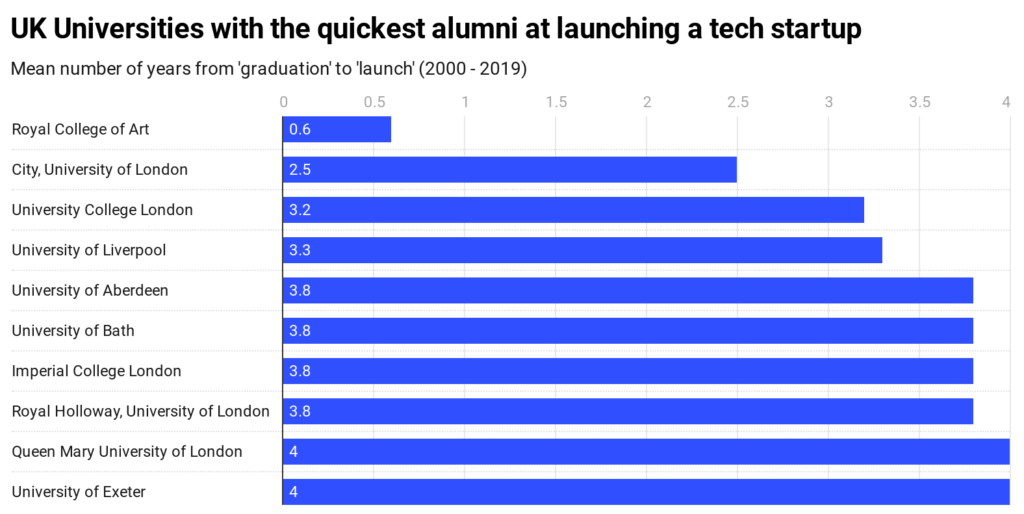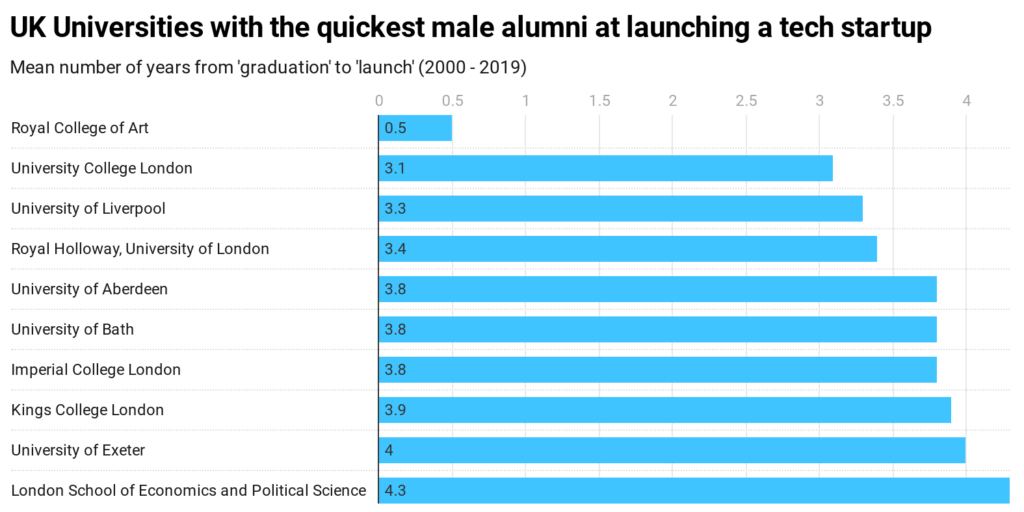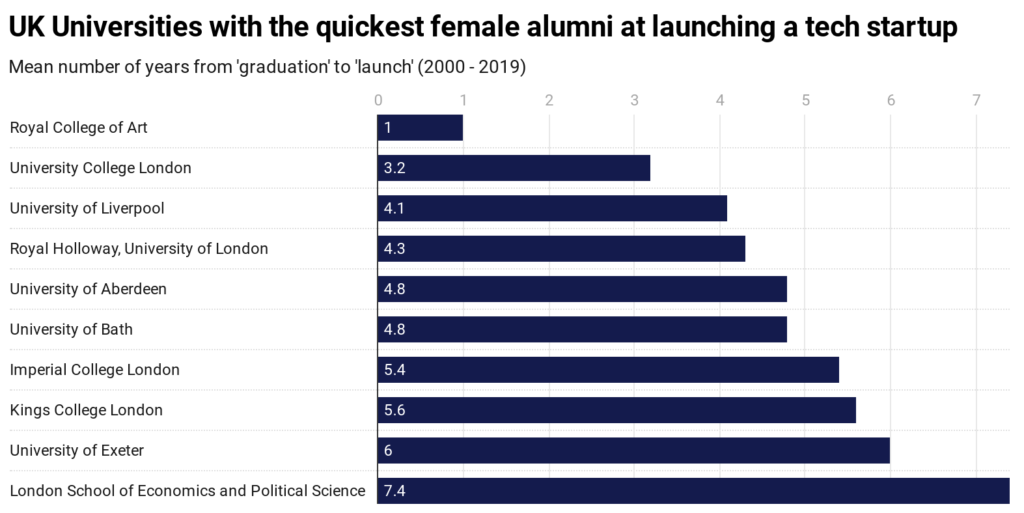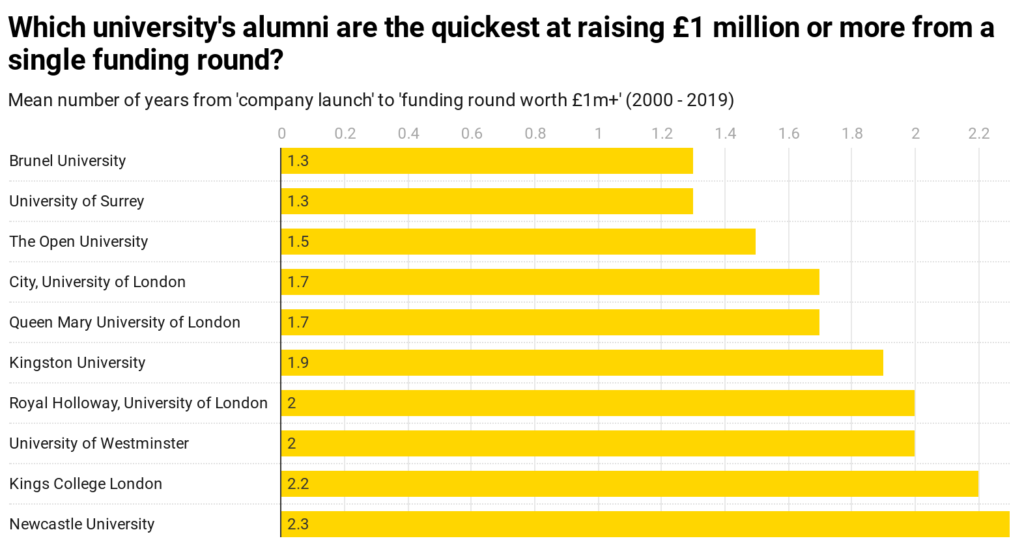
How quickly do UK students launch tech startups?

We analysed the speed at which UK university alumni launch tech startups
Investment into the UK’s tech sector surged to a record £10.9 billion in 2019, according to a government-backed report that was published in January of this year. For any budding entrepreneur wishing to launch their own tech startup, the UK remains a leading global hub to do so for founders at all stages in their career.
We wanted to discover how many entrepreneurs are moving into the tech industry since graduating from a UK university. Much is written about how far universities go – and indeed, should go – to support and prepare their students for entrepreneurship and the wider world of work. To gain an insight into how quickly entrepreneurial graduates hit the ground running, we analysed the average number of years taken since graduation for them to launch a startup within the tech sector.
The national picture
Our analysis focussed on graduates who have studied with a UK university between 2000 and 2019, and went on to launch a tech company either in the same year of graduation or afterwards.
Through Technation.io’s data commons, we found that the mean number of years taken by 1,058 UK university alumni (2000 – 2019) to launch a tech company is 4.8 years. On the surface, four to five years may seem like a reasonable amount of time for someone to take in founding a company, particularly in the tech industry, but there are plenty of examples of graduates launching much more quickly than the average suggests.
Alumni from the Royal College of Art are the quickest at launching tech startups. On average, it has taken less than a year for the postgraduate university’s students to launch tech companies.

Companies founded by their alumni include Unmade, a digital solutions company for fashion brands to create customised products at an industrial scale. It was last valued between £19m – £29m by Dealroom.co in 2019. Co-founders Kirsty Emery-Laws and Hal Watts both graduated from The Royal College of Arts at the beginning of the 2010s before launching this startup in 2013.
From which universities are male or female alumni quickest to founding tech companies?
The Royal College of Art is quickest for both male and female entrepreneurs launching tech startups – taking an average of 0.5 years and 1 year, respectively, from the year that they finish studying at the postgraduate institution.
Beyond the Royal College of Art, male entrepreneurs from University College London have enjoyed quick startup success. On average, tech companies are launched by men within 3.1 years of finishing at UCL. One of the university’s speediest company founders was Will Brocklebank, who graduated in 2015 with a degree in Business Administration and Management in the same year that he founded his AI company Shepherd, which was last valued by Dealroom between £8 million and £12 million in 2019.

Female entrepreneurs also hit the ground running after studying at Imperial College London, taking an average of 3.2 years to launch their tech startups after finishing their studies there. In 2017, Florence Gschwend both graduated from there with a PhD in Chemical Engineering and succeeded in launching a spin-off company with the university known as Chrysalix Technologies, which had raised more than £4 million in funding by 2019.

From which universities do we see entrepreneurs aged 35 or younger launching tech companies quickest after graduating?
According to Harvard Business Review’s 2018 study, the average age of a startup founder is 45 years old, but what about those entrepreneurs who buck the trend early in their careers?
Founders who launched their tech company aged 35 or younger were quickest at doing so, on average, if they studied with the Royal College of Art (0.7 years), while University College London (3 years) and the University of Oxford (3.1 years) can also boast impressive launch speeds from their alumni.
Our analysis of TechNation’s open data reveals one of the Royal College of Art’s younger founders is Jack Herring, who co-founded Jiva Materials in 2017, the same year that he graduated from the university with an MA in Design Products.
How quickly do UK university alumni raise seven-figure sums for their tech companies?
We also analysed which university’s alumni founders are quickest to raising their first £1 million or more from a single funding round.
Entrepreneurs who launched a tech company after studying at Brunel University or the University of Surrey were quickest to raising £1 million or more from a single funding round. Both universities boast four founders (2000 – 2019) who saw their companies raise seven-figure sums in a single funding round.

Brunel University also ranks quickest (1.3 years) for male entrepreneurs achieving this level of funding, while female entrepreneurs from Kingston University are quickest (1.3 years). Joanne Filbin, who graduated from Kingston University with a Bachelors in Accounting and Finance in 2004, launched her capital-raising platform Globapacap in 2017, which went on to raise more than £1 million in one round by the following year.
Which UK universities boast the most tech entrepreneur alumni?
According to our analysis of Technation’s open data, the University of Oxford lists 159 founders who have graduated between 2000 – 2019, and launched a tech company either in the year that they graduated or afterwards.
The University of Oxford also ranks highest on male tech entrepreneurs with 142, but comes second to the London School of Economics on female founders – 18 women who studied at LSE this century went on to launch at tech startup.
What did we learn?
Universities offer useful paths for students who wish to pursue entrepreneurship. Previous research of ours revealed 56% of universities offer some form of incubator to help students grow and support their business.
The Royal College of Art’s ‘InnovationRCA’ incubator seems to have clearly helped its students in launching companies so quickly, while the University of Oxford’s startup incubator, which was set up in 2011, has helped see the university boast more tech entrepreneurs this century than any other UK university.
Methodology
Our analysis considers UK university alumni (2000 – 2019) of any degree type, who were listed with graduation and company launch dates on Technation.io, and who went on to found a tech company (including spin-offs) within the same year of their graduation or afterwards. Business schools and private colleges were not considered. We treat the dates of graduation, company launch and funding round as calendar years, with months often unavailable. So if a founder graduated and launched their company in the same calendar year, this would be calculated as 0 years, and so on, before being averaged across all founders per university. Each founder’s ‘speed to launching a company’ considered the most recent university that they graduated from before launching, and that company is referred to for each calculation of ‘speed to a funding round worth £1 million+’.
Q&A with Sarah Wood, Digital Marketing Executive at Women In Tech
The results of our analysis into tech startup founders showed no real difference between how quickly male and female university alumni from UK universities go on to launch their companies. We asked Sarah Wood from Women In Tech to comment on our results, on trends in the wider industry, and to provide some tips to aspiring female entrepreneurs.
Tide: According to our recent study, it takes a similar length of time for men and women to launch a tech startup after finishing university. Do you think this is a unique trend to the tech sector or do you feel it is the same across the board?
Sarah: We’d suggest that this may be the same across the board. It’s unsurprising that more and more women are turning to entrepreneurship considering that the reality still stands that women are by large still the primary caregivers in their homes, so the flexibility that comes with entrepreneurship is attractive to women. Also, having more control over your career and the speed of which you can progress is understandably more attractive to a lot of women who may not feel like working for a tech company would open doors to the same level of progression.
Tide: If there isn’t much difference after graduation, could it be that the gap widens later on in life?
Sarah: From our experience the gap is at the beginning of the career as well with only 7% of Computer Science Grads being female. The gap also widens later on with motherhood. We recently published an article that looked into how the motherhood penalty could be a major contributor to the gender gap and judging by what we found during the research for that piece we’d agree that the gap widens later on. From our experience it seems there isn’t so much a shortage of women wanting to work in tech, it’s more of a case of companies retaining women in tech.
Unfortunately, many women get close to senior and leadership positions in the sector then find they are negatively impacted by the motherhood penalty. A trend we found was women either not returning to their work full-time after having a baby or going back into more junior positions that pay less, meaning the gender pay gap is then widened further. A working solution to the motherhood penalty could be the normalisation of shared parental leave.
Tide: What are your recommendations for women that want to launch their tech startup?
Sarah: First and foremost, have the confidence to persist and see your dreams through. A more practical recommendation would be to utilise the ‘plugged in’ connected world we live in and engage in networking on sites such as LinkedIn! No advice is too much advice and all advice is valuable in some way, so seeking out help from experts is a must also. If you haven’t decided on what your business will be just yet, definitely find your niche and research ways you can contribute to the market and improve it. Lastly, never underestimate how valuable you are as a woman in tech.
Tide: Are there specific organisations women could reach out to in order to get help with resources to start a tech company, such as fundraising, mentorship, etc?
Sarah: On womenintech.co.uk we publish regular guides detailing resources women can access to help them start or change to a career in tech. We actually run our own Mentorship programme where we match mentees with appropriate mentors and support a virtual working relationship between the two.
Tide: The tech sector is known to be predominantly masculine, is this statement true? If yes, what can be done to encourage more women to enter it?
Sarah: Unfortunately, this statement is still true in the tech sector. Women make up around 17% of the sector. It’s a complex problem and there’s no one solution that will narrow the gender gap. However, the most important factors that we believe will actively narrow the gap are the visibility of more female role models for future generations of tech women, encouraging girls to study STEM subjects at school, employers adopting measures such as more flexible working opportunities and better parental support to retain women in tech in the long run. Breaking down gender stereotyping in the sector by telling the stories of the women already proving that tech can be as much of a gender-diverse world as it is a man’s world is also important. Ultimately narrowing the gap will rely on a combination of education, empowerment, and more companies breaking the mould and leading the way. Tech companies coming together to make gender diversity in the sector a priority will also be crucial.
Tide: From your experience, what are the main obstacles that minorities face when wanting to start a business?
Sarah: One of the biggest challenges is access to capital! We recently published an article about where female tech entrepreneurs can find grants and funding, during the research for that piece we discovered that when it comes to achieving capital following a pitch for a start-up men are four times more likely than women to succeed. There are many factors that could explain why this is, but the most likely reason is unconscious bias, which presents a real obstacle for women in tech to this day.
Tide: What is the role of universities when it comes to entrepreneurship?
Sarah: It’s difficult to say whether you can truly teach someone to be an entrepreneur. However, universities have a level of responsibility to provide students with access to resources, confidence building and networking opportunities to nurture entrepreneurial students from a whole host of disciplines and backgrounds. University is a unique time where young adults are full of hope and possibility for the future! Universities with the resources to deliver lectures, workshops and fairs centered on entrepreneurship should encourage as many students as possible to partake.
Women In Tech is an online support service for female professionals in the technology industry, which promotes greater diversity in the workforce.
Are you looking to start your own business?
Registering your business with Tide is incredibly fast, easy and free. You not only get to officially start your company, but you get a free business bank account at the same time, which is the best way to ensure you’re keeping your finances in order from day one. Be your own boss and register your company with Tide! 🎉
Photo by Godisable Jacob, published on Pexels
Join our community of entrepreneurs, freelancers and small business owners
Tide is here to help small business owners and sole traders save time and money. Take a look at our Business Bank Account and get time back to focus on your business.






